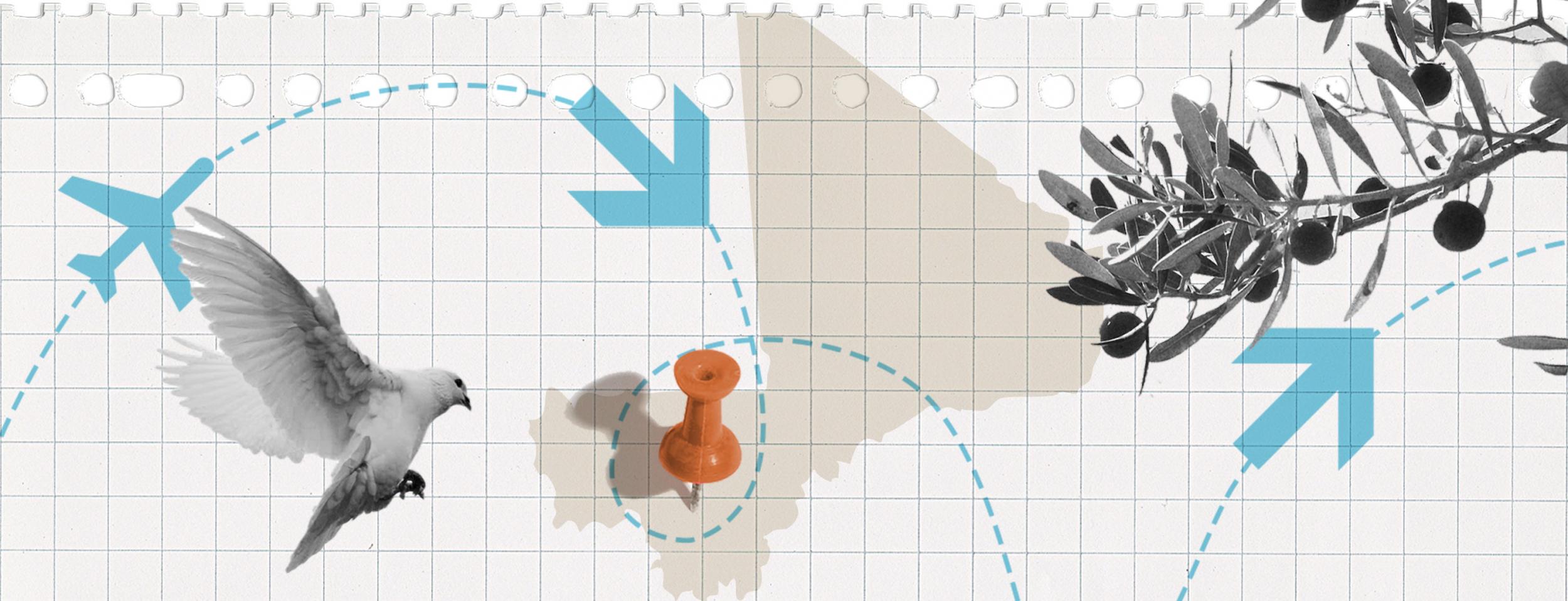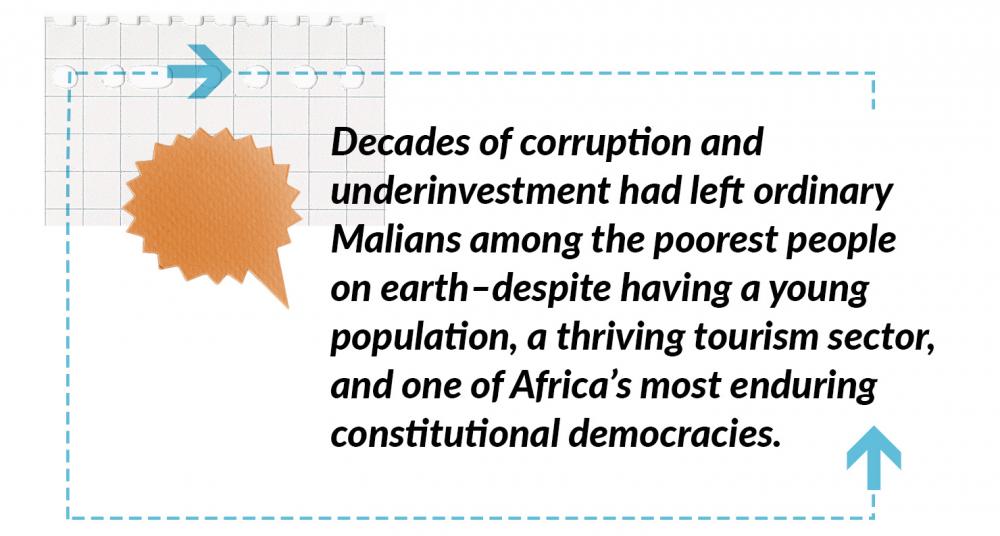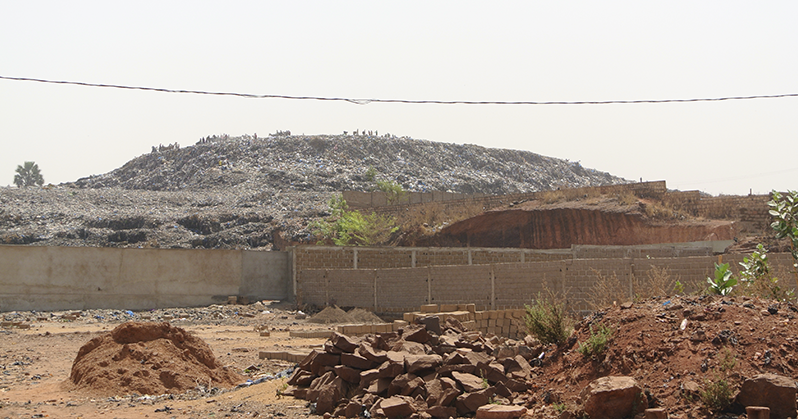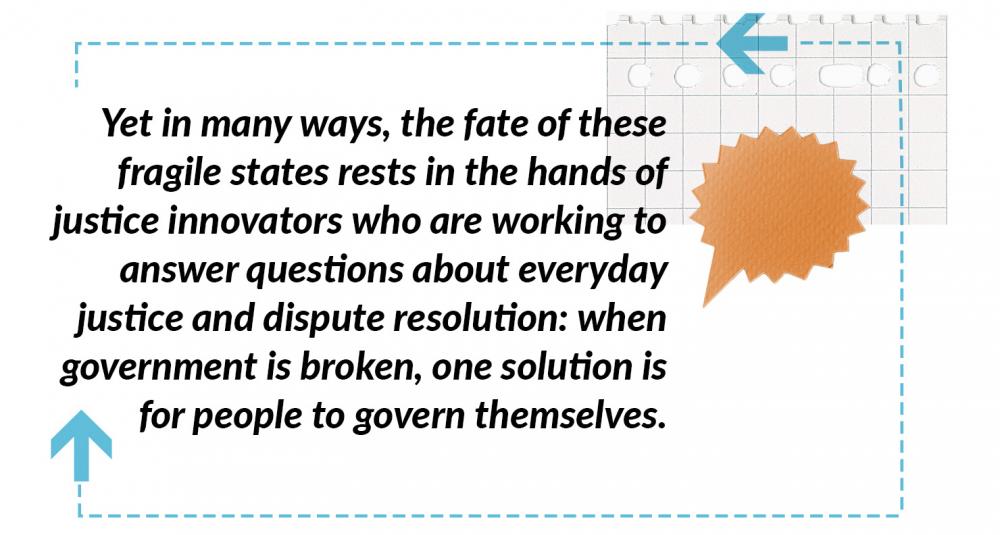
This is part three of a four-part series on how access to justice build resilience in the Sahel. Read the introduction here.
In Mali, where I had arranged to interview local citizens leading the effort to expand access to justice, the situation was grim.
The differences began at the airport, where a frenzied intensity reigned. A thin line of passengers, nearly all of them soldiers or aid workers, trickled through a fever checkpoint, then onward to the waiting sun. Otherwise the terminal remains empty, its shops dark, as passengers were admitted one flight at a time. Malian security forces linger outside, rifles at the ready, keeping watch over the missionaries and peacekeepers who were waiting to leave the country. As each flight opens, a brusque screener barks at passengers who are waiting to check their luggage. My driver is waiting pensively at the gate, so we speed off in his dark blue Land Rover.
The streets of Bamako are stunningly crowded. What scant open space remains has been strewn with debris — the flotsam of a million half-finished projects — while every stationary object is coated with an ochre patina of dust. It is as if the teeming city would become a desert mausoleum if ever its residents stopped hustling for a moment's rest. In the distance, a line of trash pickers inches along the crest of a mountain of garbage. At each intersection, children throng the waiting vehicles, peddling bags of water or plastic Chinese doodads. There are no traffic lights: they have been torn down, I am told, because people associate them with the state; so as long as we remain caught in the snarling traffic, the children have ample time to approach my window, pleading for argent! argent! Yet as I wave hello and make eye contact with a one young boy, he dashes shyly away. "Africans do not like to have their picture taken by outsiders," explains my guide, "because they will be used to paint a negative picture of our humanity."
At the hotel, a security team sweeps the undercarriage of our vehicle for explosives before a heavy blast door slides back into high concrete walls. They wear fatigues and berets, giving the interaction a paramilitary air. Once again, I am compelled to pass my luggage through an X-ray before submitting to document verification and a fresh temperature check. Inside, the hotel lobby is cool and breezy. Afro-pop wafts softly through the air. It is as if I have entered a different country.
Though I am one of few remaining guests at my hotel, and the guards quickly learn my face, we will rehearse this precise performance each day that I remain in Bamako. The cordon is not for show. According to the World Justice Project's Rule of Law Index 2020, Mali ranks 122 out of 128 for Order and Security, meaning it is among the least secure countries in the world — just ahead of Venezuela, Cameroon, and the Democratic Republic of Congo. This figure reflects the dangers faced by ordinary Malians who are caught between armed groups and national security forces. In addition, Mali has become perilous for anyone whom separatists perceive to be allied with the state. Criminal gangs fund their activities through ransom, and aid workers have been victims of carjacking, kidnapping, and murder. International hotels are a favored target of armed extremist groups in Mali. In 2015, Islamic militants stormed the Radisson Blu, a popular destination for international professionals visiting Bamako, taking 170 hostages and killing 20.
These are the conditions of civil war. In 2012, longstanding tensions flared between the government and nomadic Touareg rebels in the northern Azawad region. The army, led by a mid-level officer who was dissatisfied with the government's response, staged an ill-conceived coup, toppling Mali's democratically elected president, Amadou Toumani Touré. The country quickly plunged into chaos. Extremist groups occupied the Islamic heartland in Gao and Timbuktu, destroying artifacts and imposing sharia law. The rout captured global attention. The Economic Community of West African States (ECOWAS) intervened with more than 3,000 troops, followed by an African-led force with backing from the UN Security Council. Then in 2013, at the behest of interim President Dioncounda Traore, France staged a major intervention dubbed Operation Barkhane. This counter-insurgency operation has expanded to five countries in the Sahel — all of them former colonies — becoming one of the largest campaigns undertaken by the French military since the Algerian War of 1954–1962. More recently, the United Nations launched a joint mission, MINUSMA, tasked with securing the peace in areas liberated from Islamist control. In addition, the international community has responded with increased military cooperation and a strategic plan to boost development spending.1
Some Malians I spoke with credited these interventions with saving the nation, while others questioned whether France should have gone further in routing the insurgents. All of them agree that a military campaign alone will not be enough to secure Mali's future. In my conversations with Malians, it has become clear that the Tuareg rebellion was a hand that tore the stitching off widespread resentment against the government. Decades of corruption and underinvestment had left ordinary Malians among the poorest people on earth — despite having a young population, a thriving tourism sector, and one of Africa's most enduring constitutional democracies.

Yet Mali also offers a stark example of the courageous efforts by citizens determined to pursue justice in the face of long odds. The individuals whom I interviewed in Bamako are repairing the fabric of their society by bringing justice services into Mali's least governed spaces, then working to integrate these solutions within Mali's centralized bureaucracy. Their efforts comprise a crucial strand in the fabric of peace and resilience, and their voices provide valuable insight about the nuanced challenge of bridging the gap between traditional leaders and a formal justice system in retreat.
Accompanying these reflections, the World Justice Project is releasing some of these exchanges as a special series of our podcast, Rule of Law Talk. In the first installment, I share my conversation with program officers from two organizations, ABA-ROLI and Temedt, who are working to end descent-based slavery in Mali. We discuss a successful two-year program, funded by the U.S. government, which enlisted customary justice to help emancipate, raise awareness, and secure legal documentation for hundreds of victims of slavery. We also discuss the problem's intractability in the Sahel, including the difficulty of achieving legislative reform at a national level.

All of these justice champions emphasize the importance of integrating traditional authorities into the formal justice system — though opinions differ regarding the challenge of doing so without undermining the rights of women and minorities. Civil justice problems extend beyond the family, the neighborhood, and the marketplace. In the Sahel, an unresolved dispute over land or water rights can mean the difference between conflict and peace, subsistence and starvation, freedom and enslavement. To expand access to justice, therefore, is to provide hope and dignity to communities living in extremis.
At first, access to justice might seem like a trivial matter in the face of civil war. Across the Sahel, thousands of people are victims of armed conflict, forced displacement, and human rights abuses at the hands of their government. Yet in many ways, the fate of these fragile states rests in the hands of justice innovators who are working to answer questions about everyday justice and dispute resolution: when government is broken, one solution is for people to govern themselves. Sahelian cultures are steeped in the traditions of a precolonial state, the Songhai Empire, with all the diversity that entails. Solving the civil justice equation means, in practice, weaving that complexity into modern states without permitting one group to predominate. Crucially, this goal requires negotiating a place for powerful Islamic leaders at the heart of a secular, pluralist society. It also entails harmonizing the rigid strictures of a French civil code with the flexible pragmatism of traditional authorities.
Indeed, civil disputes have been at the heart of conflict in the Sahel. While the threat posed by transnational terrorist groups is real — a point quickly seized by Western media, when they have covered the conflict at all — the greater crisis is one of state legitimacy among ethnic minorities. In remote arid regions, population growth and desertification have placed increasing strain on food and water supplies, thus increasing conflict among rural communities and intensifying competition to control strategic routes for migration and trade.2 In particular, constraints on arable land have led to conflicts between farmers and herders. Even with international support, the government has proved unwilling or incapable of resolving these conflicts in a durable way, so communities feel compelled to take up arms in order to defend their interests.

Religious affiliation and transnational kinship networks link these local disputes to a lucrative regional trade in small arms, narcotics, and slaves.3 In particular, jihadist groups can exploit local conflict by offering relative security and expedient justice — and, crucially, a degree of predictability for local businesses who must navigate black markets to survive.4 In a context of extreme insecurity, Islam offers the moral imprimatur of piety as well as a lucrative path for young people — especially young men — who have few other options to sustain themselves and their families.
If the government of Mali hopes to repair the damage wrought by this crisis, it will need international support to stamp out terrorism; however, it will also need to address the underlying drivers of fragility and conflict. Order and security are paramount to restoring confidence in the government. But if the state emphasizes a military strategy to the exclusion of justice, then it sends a perverse message to local communities who feel they must arm themselves to be taken seriously by elected officials. The rewards of violence cannot outweigh the olive branch of peace.
1 In 2012, the UNSC authorized the African-led International Support Mission to Mali (AFISMA); in addition, UN resolution 2056 addressed security, governance, and resilience, calling upon the EU, World Bank, and IMF to create an Action Fund for the Sahel Region, administered by the African Development Bank. In 2014, AFISMA expanded into an international stabilization effort, renamed MINUSMA; Mauritania and Mali signed a cooperation agreement to combat armed terrorist groups; ECOWAS developed a strategy that includes watershed agencies and transnational structures specialising in pastoralism, irrigation, youth, gender, peace education, and democracy; the G-5 Sahel cemented a partnership between Burkina Faso, Chad, Mali, Mauritania, and Niger; and the African Union Mission for Mali and the Sahel (MISAHEL) brought together Algeria, Burkina, Chad, Libya, Mali, Mauritania, Niger, and Sudan. In 2019, a coalition of high-level donor agencies formed the Sahel Alliance, announcing €11 billion in funding for 730 projects by 2022. These funds are planned to support the G5 countries in six "priority zones," including education and youth employment, agriculture, rural development, food security, energy and climate, governance, decentralization and basic services, and internal security.
2 For an overview, see: OECD/SWAC (2020), The Geography of Conflict in North and West Africa, West African Studies, OECD Publishing, Paris, https://doi.org/10.1787/02181039-en
3 The situation in Mali was not always so dire. Following a 1991 coup that ended 30 years of one-party rule, Mali came to be widely regarded as a model for democracy in Africa. Despite being landlocked and one of the world's poorest countries, its economic growth spiked in 2001, before stabilizing near 5% throughout the period from 2005–2010. Bamako became one of Africa's fastest growing cities, and tourism boomed in the desert regions as visitors flocked to historic sites in Gao and Timbuktu. A symbol of this secular openness was the Festival in the Desert, an international gathering, which showcased Mali's rich musical heritage, which fuses Western styles and instrumentation with traditional musical forms. Yet despite these promising signs, Malian democracy was rotten at the core: decades of corruption, poor governance, and lack of justice had undermined confidence in the ruling elite. When these long-simmering tensions erupted into full-scale revolt by the Touareg minority, the country's underlying fragility became evident. Frustration with the President's handling of the rebellion boiled over, crippling the state and allowing Islamist groups such as al-Qaeda in the Islamic Maghreb (AQIM) and the Islamic State to inject themselves into the breach.
4 For a fascinating study of how this dynamic has helped to shape the conflicts in Afghanistan, Somalia, and Mali, see Ahmad, Aisha. Jihad & Co.: Black Markets and Islamist Power. Oxford UP, 2017.
Support for "Access to Civil Justice in the Sahel" has been provided by the Knowledge Management Fund, a program of the Knowledge Platform Security & the Rule of Law at the Clingendael Institute for International Relations, Netherlands.
